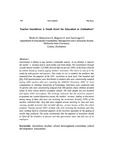Please use this identifier to cite or link to this item:
https://cris.library.msu.ac.zw//handle/11408/1268Full metadata record
| DC Field | Value | Language |
|---|---|---|
| dc.contributor.author | Shoko, N. | - |
| dc.contributor.author | Manyumwa, E. | - |
| dc.contributor.author | Muguwe, Emely | - |
| dc.contributor.author | Taruvinga, F | - |
| dc.date.accessioned | 2016-05-09T09:15:20Z | - |
| dc.date.available | 2016-05-09T09:15:20Z | - |
| dc.date.issued | 2011 | - |
| dc.identifier.uri | http://hdl.handle.net/11408/1268 | - |
| dc.description.abstract | Government is failing to pay teachers sustainable salaries. In an attempt to improve the teacher’s incomes and to check strikes and brain drain, The Government through circular minute number 5 of 2009, directed that ten percent (10%) of the levies collected by schools should go towards paying teacher’s incentives. This led to an outcry in the media by both parents and teachers. This study set out to establish the problems that emanated from the payment of the 10% incentives at local level. One hundred and fifty (150) questionnaires were distributed to teachers who were conveniently sampled among 1200 teachers who were marking the ZIMSEC November 2009 O level examinations at Chinhoyi University of Technology. Interviews were conducted with 30 parents who were conveniently sampled from 100 parents whose children attended school in three Gweru district secondary schools. The total sample was one hundred and eighty (180) participants. The findings indicated that the incentive payment programme has created disparities among the teacher’s incomes, leading to discontent among many of them who were not receiving the incentives. Seventy (70%) of the teachers indicated that they had since stopped serious teaching in class and were running parallel activities that included offering private lessons within the school premises. Twenty percent (20%) of those who were receiving the incentive said they were working hard as continued payment of the incentive depended on the quality of results they produced. The study recommends that the payment of incentives should be lifted off the shoulders of parents and that government must take full care of its employees. | en_US |
| dc.language.iso | en | en_US |
| dc.publisher | Midlands State University | en_US |
| dc.relation.ispartofseries | The Dyke;Vol. 5, No. 1; p. 162-173 | - |
| dc.subject | Incentives, Teacher, School development committee, School development association | en_US |
| dc.title | Teacher incentives: a death knell for education in Zimbabwe? | en_US |
| dc.type | Article | en_US |
| item.cerifentitytype | Publications | - |
| item.languageiso639-1 | en | - |
| item.openairecristype | http://purl.org/coar/resource_type/c_18cf | - |
| item.fulltext | With Fulltext | - |
| item.grantfulltext | open | - |
| item.openairetype | Article | - |
| Appears in Collections: | Research Papers | |
Files in This Item:
| File | Description | Size | Format | |
|---|---|---|---|---|
| teacher incentives.pdf | Full Text | 258.44 kB | Adobe PDF |  View/Open |
Page view(s)
92
checked on Apr 15, 2025
Download(s)
18
checked on Apr 15, 2025
Google ScholarTM
Check
Items in MSUIR are protected by copyright, with all rights reserved, unless otherwise indicated.



